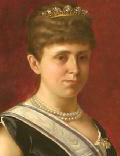 |
María Cristina
b. 21 Jul 1858, Schloß Židlochovice (Groß Seelowitz), Margraviate of Moravia
d. 6 Feb 1929, Madrid, Spain |
| Title: |
Por la gracia de Dios y la Constitución, Reina Regente de España (By the Grace of God and of the Constitution, Queen Regent of Spain) |
| Term: |
25 Nov 1885 - 17 May 1886 |
| Chronology: |
25 Nov 1885, following the death of her husband, King Alfonso XII, assumed regency for the period of abeyance as mother of a future King or Queen of Spain, Art. 67 of the Constitution of 1876 [1] |
|
27 Nov 1885, took the oath of allegiance, meeting of the Council of Ministers, Real Palacio, Madrid [2] |
|
30 Dec 1885, took the oath of allegiance, joint session of the Senado and Congreso de los Diputados, Palacio del Congreso, Madrid [3] |
| Title: |
Reina Regente del Reino (Queen Regent of the Kingdom) |
| Term: |
17 May 1886 - 17 May 1902 |
|
17 May 1886, continues in office as Queen Regent following the birth and proclamation of her son, Alfonso XIII [4] |
|
17 May 1902, ceased to act as Queen Regent when her son, Alfonso XIII, reached majority as specified in Art. 66 of the Constitution of 1876 |
| Names/titles: |
Baptized: Maria Christina Désirée Henriette Felicitas Rainiera von Habsburg-Lothringen; Spanish: María Cristina Deseada Enriqueta Felicidad Raniera de Austria y de Austria-Este (Habsbourg-Lorena) |
| Biography: |
Born in the family of Karl Ferdinand Erzherzog von Österreich and Elisabeth Franziska Maria Erzherzogin von Österreich, descendants of Kaiser Leopold II; married King Alfonso XII of Spain (29 Nov 1879); was the mother of three legitimate children of Alfonso XII: Infanta María de las Mercedes, Infanta María Teresa, and Alfonso XIII, who was born posthumously; following the death of her husband (25 Nov 1885), acted as queen regent during the abeyance period (25 Nov 1885 - 17 May 1886); after giving birth to Alfonso XIII (17 May 1886), who was immediately proclaimed king, she continued as regent until her son reached the age of sixteen (17 May 1902); continuously relied on the advice of the liberal leader, Práxedes Mateo-Sagasta, who served as President of the Council of Ministers; promulgated the laws on the freedom of associations (1887) and universal male suffrage (1890); the last years of regency were marked by the problems in international policy (Morocco, Spanish-American War, loss of colonies). Biography source: [5] |
| |
| [1] |
Gaceta de Madrid, jueves 26 de Noviembre de 1885. Núm. 330. P. 665. |
| [2] |
Gaceta de Madrid, sábado 28 de Noviembre de 1885. Núm. 332. P. 694. |
| [3] |
Diario de las sesiones de Cortes: Senado: Sesión Regia, celebrada el día 30 de Diciembre de 1885, á las dos de la tarde. Número 5. P. 29. |
| [4] |
Gaceta de Madrid, martes 18 de Mayo de 1886. Núm. 138. P. 483. |
| [5] |
Enciclopedia de Historia de España. Diccionario biográfico. (Madrid: Alianza Editorial, 1991). |
| [6] |
Portrait by Tomás Povedano de Arcos (1889). |

